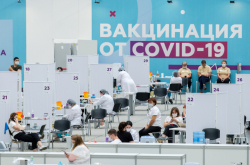“The discoveries by the two Nobel Laureates were critical for developing effective mRNA vaccines against COVID-19 during the pandemic that began in early 2020,” states the Nobel Assembly’s official website.
As acknowledged in the press release, the work of Katalin Karikó and Drew Weissman made it possible to develop vaccines against COVID-19 in record time.
Matrix RNA was first suggested for use in vaccination over 30 years ago, but the first experiments demonstrated that the technology can be accompanied by undesirable inflammation reactions caused by the immune response.
Katalin Karikó and Drew Weissman have found a way to avoid these complications. In 2005, they found a modification of RNA that didn’t trigger a response in human cells. Later, it was demonstrated that one key marker is enough to mask the RNA – N1-methylpseudouridine instead of uracil. Thus modified, mRNAs didn’t cause an immune response and instructed cells to produce greater amounts of the desired protein.
Later, the researchers patented the use of modified nucleosides to lower the immune response to mRNA. Thanks to the nucleoside modifications they discovered, it was possible to develop mRNA vaccines against COVID-19, including Pfizer/BioNTech and Moderna.
“One of the features of mRNA vaccines is their versatility. If we know their target (a specific virus), we can develop vaccines for a wide range of purposes. Thanks to this technology, we can quickly react to challenges that we have to face – as it was demonstrated during the pandemic. Katalin Karikó and Drew Weissman have provided us with understanding of many basic mechanisms thanks to their fundamental research. At the same time, we can see how DNA- and RNA-based technologies have already been adapted in engineering to be used as a platform for efficient market solutions,” says Prof. Ekaterina Skorb.

Ekaterina Skorb. Photo by ITMO.NEWS
According to Ekaterina Skorb, the fact that this year’s Nobel Prize in physiology or medicine was awarded for research in mRNA vaccines indicates the ripeness of this technology to be used in treatments for infections and tumors, targeted drug delivery, and other challenges. This means that new questions are on the agenda for researchers around the globe.
“By using mRNA and analyzing immune response mechanisms, we can understand various processes in the body. Solutions have been suggested to other problems, such as mRNA delivery. Polyelectrolyte and supramolecular systems also present a research interest. Moreover, these days there is an interest in not only delivering vectors and active components, but also the analysis of reaction cascades in such systems. These issues are studied by system- and infochemists, as well as chemoinformaticians all over the world,” says Prof. Skorb.





